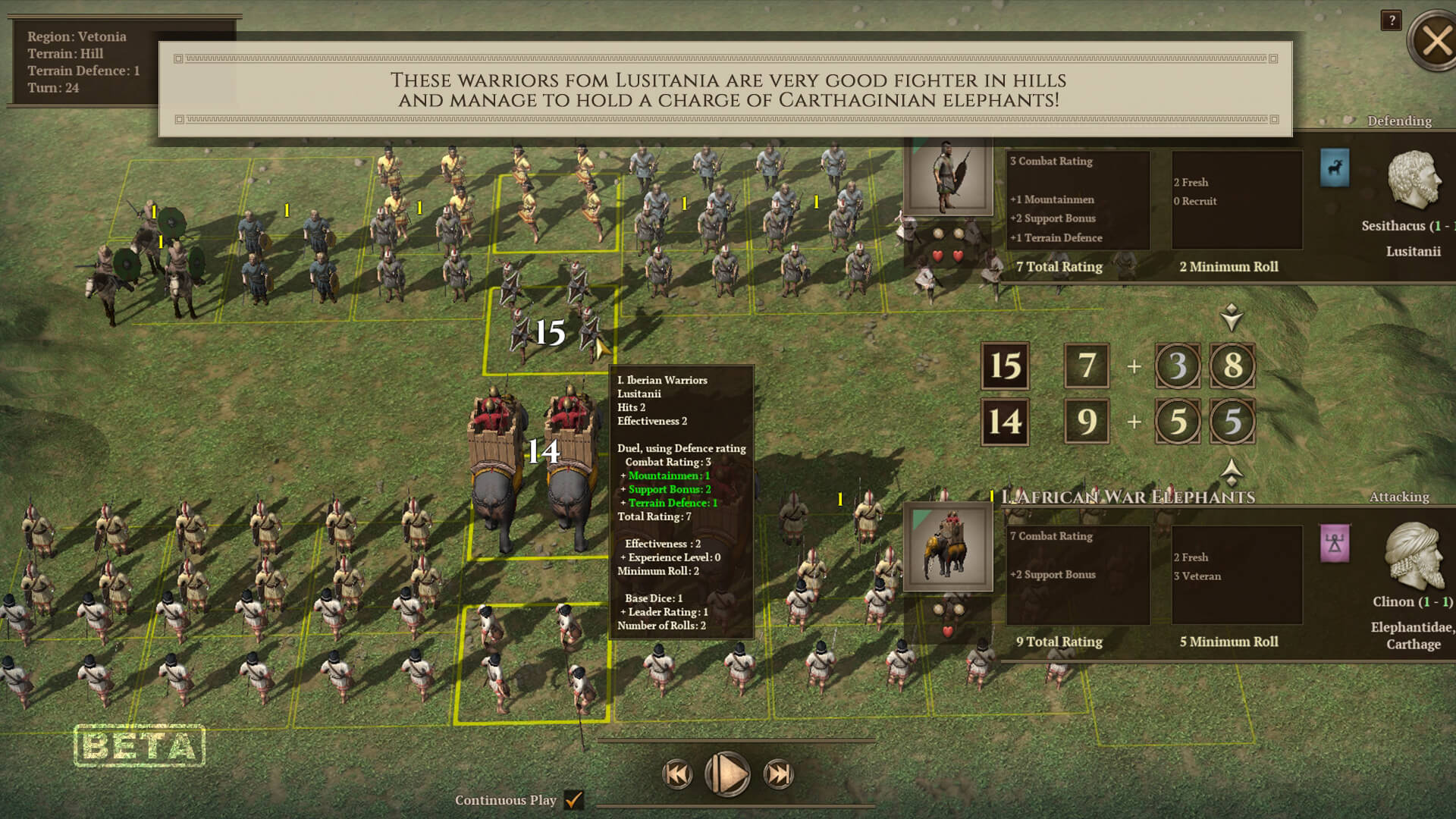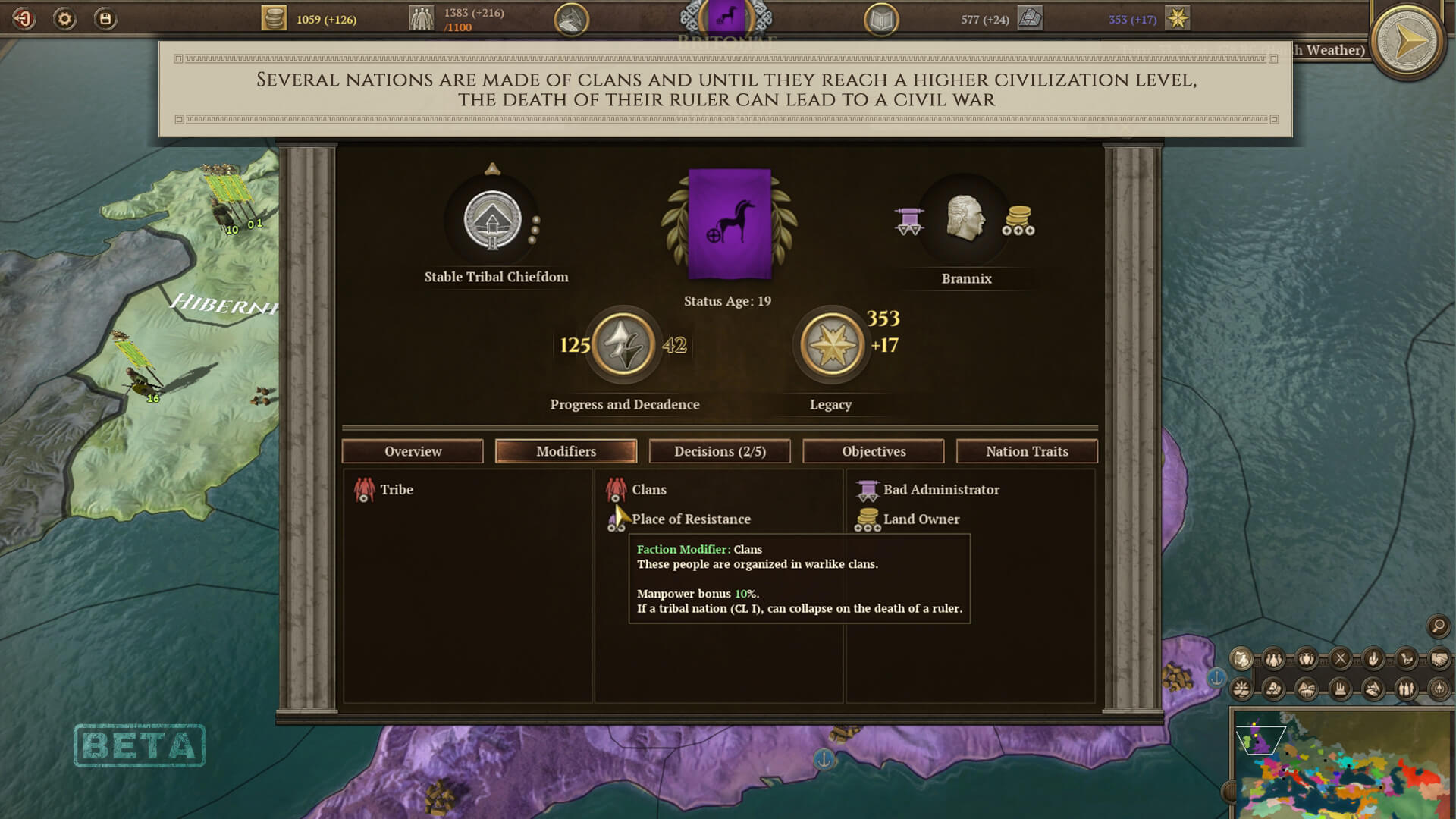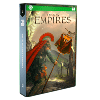Units in Empires have very diverse profiles and different roles. Some are heavy hitters, like phalanxes, legions and other heavy infantry. These units cost a lot to recruit and maintain, and will use a lot of metal, so can’t be mass produced easily. They have drawbacks too, like being relatively slow and not fit to fight in terrain like forests or mountains.
Another category is the medium infantry, which is apparently less powerful, more affordable and has the useful ability of being a besieger, meaning it will provide a bonus when you siege a city. This reflects the value of these formations in being able to construct heavy siege engines on the spot (you did not drag siege towers along your army when you were on the march). Given they are more affordable, you can field a lot of these troops, and this might be necessary since battles have an important concept of ‘frontage’, which is the width of the battle line. Previous players from AGEOD game will be well aware of this feature, as it appeared in 2004 with Birth of America, and it never ceased to play an important and realistic role in all our games. Failure to fill out your available front line will leave you very vulnerable to being outflanked or forced to commit your skirmishers to actual hand to hand combat (not a good idea!).

The skirmishers are another sort of unit. They are not costly, although the manpower they need is close to the types above (so make a lot demands on your population to fill out their ranks from the pool of conscripts used for units). In melee, they are quite weak, but this is not where they should be used. They are there to help support your main infantry, by providing a combat bonus to them. A medium infantry unit backed by a skirmisher is as strong, if not more so, than a heavy infantry without support. Add to that they will weaken the enemy before melee through their missile attack, and you will quickly come to see that they are not optional to a good army composition.
Cavalry is another subset of units and plays an important role on the battlefield and the strategic map. Light cavalry will perform as skirmishers but most types can also flank the enemy. It means that should your opponent don’t fill up the battle line, then they will deal bonus attacks against the enemy. Should you manage to inflict a defeat to your opponent, then their pursuit bonus will deal significant damage during the retreat phase. On the strategic map, they are faster than even skirmishers, so can act as a fire brigade of sort. But they are not ideal if they have to fight on their own as they are rather brittle, except perhaps if they are heavy cavalry or cataphracts. Plus skirmishers help a city resists a siege, while cavalrymen don’t do much but eating the food stockpile in this situation!
The important thing to remember is that through quite a lot of fine tuning and testing, we have managed to give each unit a role that defines them well. And also that costlier units are not always better in all circumstances, so if you enjoy tweaking your army composition, then you should have some fun testing out combinations.
But there is more to it than that, as units also have some custom abilities contextual to some terrain. For example, many Celtic nations have light and medium infantry which are woodmen, so they are better when fighting in the huge forests of Gallia. In the same way, German warriors benefit from this trait too, given how large and continuous, almost overwhelming, was the big Hercynian forest where many lived.
You’ll also fight mountainmen, if you have to deal with Celtiberian tribes, or people from Armenia or Colchide. Arabia Felix or the vast expanses of desert bordering Carthage proper will see cameliers with the desertmen traits, etc.
But some traits are not a bonus, they are a drawback. For example, elephants dislike cold terrain, and Phalanxes are not fit to assault a city.
Other traits are about how units fought on the battlefield. For example, skirmishers, horse-archers and light cavalry can deal damage even when they lose a duel, or to add insult to injury, they can even shave off part of the damages they received by evading the melee! As some of you know, the battle of Carrhae was a major defeat for Rome against Parthia, mostly because the latter had a lot of horse-archers (backed up by supply wagons to replenish their stock of arrows) while the legionnaires were trying (and failing) to reach the enemy line. In Empires too, I would not bet on the mighty legions if they have no support from archers or skirmishers, against a full battle line of Parthian horse archers!
Hopefully this will give you an idea about how Empires manages units and the different possible battles you will experiment.
But traits, also called modifiers, are everywhere in the game. Rulers have traits, ranging from being a superior administrator to being paranoid. The variations are numerous, and the chance to get the same ruler twice is very small. This in turn will shape your nation and alter your strategy, as a good military ruler will provide a lot of bonus which will be a boon to your army, while someone who despises the idea of expanding his realm will be an issue if you wanted to conquer and gobble your neighbor.
Units and rulers have traits (or modifiers) but each government is also different using their own range of abilities. For example, a tribal government will provide a bonus to manpower, and that’s fitting as units filled with warriors will need a lot of men and not that much heavy armor to be recruited. A merchant oligarchy like Carthage will enjoy extra bonuses for commerce but will be heavily penalized on manpower, thus lending to a style of gameplay where you’ll need to recruit a lot of mercenaries (and the ones for Carthage are rather good!).
In the end, through the judicious (or so we hope) use of modifiers, you’ll see that all the nations play rather differently from one another. Because their units are different, or perhaps their government. And then there are the custom buildings with special abilities! Here, we are mostly not talking about something like “Get +10% from that or that”, this would be dull… Buildings have specific abilities or behaviors that significantly alter the game and how you will tackle a nation. Judea with the possible, but difficult, task to rebuild the Solomon Temple (coming in no less than 7 levels of upgrades!), Saba with the impressive Ma’rib dam which can be either a boon or a curse (depending if you repair it or not), Dacia with its mountain fortresses, etc.



 Cart (0)
Cart (0)


